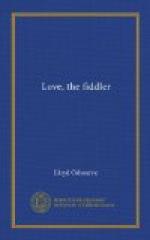I put out my arms in the dark and caught her to me. I could not believe my own good fortune as I felt her trembling and crying against my breast. I was humbled and ashamed. It was like a dream. An old fellow like me—forty, you know.
“It was a mighty near thing, Teresa,” I said.
“I guess it was—for me!” she said.
“I meant myself, sweetheart,” I said.
“For both of us then,” she said, in a voice between laughter and tears, and impulsively put her arms round my neck.
THE AWAKENING OF GEORGE RAYMOND
I
George Raymond’s father had been a rich man, rich in those days before the word millionaire had been invented, and when a modest hundred thousand, lent out at an interest varying from ten to fifteen per cent, brought in an income that placed its possessor on the lower steps of affluence. He was the banker of a small New Jersey town, a man of portentous respectability, who proffered two fingers to his poorer clients and spoke about the weather as though it belonged to him. When the school-children read of Croesus in their mythology, it was Jacob Raymond they saw in their mind’s eye; such expressions as “rich beyond the dreams of avarice” suggested him as inevitably as pumpkin did pie; they wondered doubtfully about him in church when that unfortunate matter of the camel was brought up with its attendant difficulties for the wealthy. Even Captain Kidd’s treasure, in those times so actively sought for along the whole stretch of the New England coast, conjured up a small brick building with “Jacob Raymond, Banker” in gilt letters above the lintel of the door.
But there came a day when that door stayed locked and a hundred white faces gathered about it, blocking the village street and talking in whispers though the noonday sun was shining. Raymond’s bank was insolvent, and the banker himself, a fugitive in tarry sea clothes, was hauling ropes on a vessel outward bound for Callao. He might have stayed in Middleborough and braved it out, for he had robbed no man and his personal honour was untarnished, having succumbed without dishonesty to primitive methods and lack of capital. But he chose instead the meaner course of flight. Of all the reproachful faces he left behind him his wife’s was the one he felt himself the least able to confront; and thus, abandoning everything, with hardly a dozen dollars in his pocket, he slipped away to sea, never to be seen or heard of again.
Mrs. Raymond was a woman of forty-five, a New Englander to her finger-tips, proud, arrogant, and fiercely honest; a woman who never forgot, never forgave, and who practised her narrow Christianity with the unrelentingness of an Indian. She lived up to an austere standard herself, and woe betide those who fell one whit behind her. She was one of those just persons who would have cast the first stone at the dictates of conscience and with a sort of holy joy in her own fitness to do so. For years she had been the richest woman in Middleborough, the head of everything charitable and religious, the mainstay of ministers, the court of final appeal in the case of sinners and backsliders. Now, in a moment, through no fault of her own, the whole fabric of her life had crumbled. Again had the mighty fallen.




